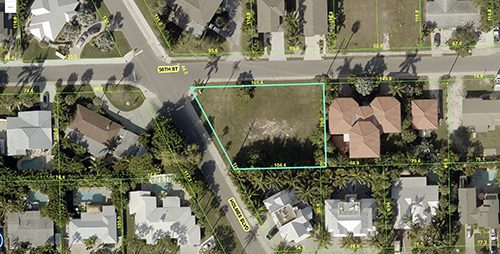HOLMES BEACH – After more than five years of legal battles, all the Bert Harris Act cases lodged against the city are officially settled, but some neighbors think officials were too generous to developers.
The Bert J. Harris, Jr. Private Property Rights Protection Act allows for compensation when a new law unfairly affects real property rights.
When city leaders enacted restrictions on occupancy and the number of bedrooms in short-term rental units nearly six years ago, they wound up with more than 60 Bert Harris complaints coming into city hall with many of those going before judges in Manatee County Circuit Court. Despite winning cases concerning occupancy, there were several still active with appeals to both the circuit and higher courts in Florida, along with a few concerning the maximum allowed number of bedrooms.
In Holmes Beach, the maximum occupancy for short-term rentals is two people per bedroom or six total, whichever is greater. New development of rental properties is also limited to a total of four bedrooms for a single-family property or two bedrooms per side of a duplex.

After holding a shade meeting with attorneys earlier in the month, commissioners met on Oct. 26 to publicly acknowledge the proposed legal settlements and vote to accept four of the five agreements.
The fifth settlement, Mayor Judy Titsworth said, is to be signed by representatives from the Florida League of Cities and states that the league, which has been covering court costs for the city, will not attempt to recoup legal fees from plaintiffs in 24 occupancy cases that the city won.
The other settlements concerning development rights were accepted by commissioners in a 3-2 vote, with Commissioners Jayne Christenson and Kim Rash dissenting.
Under the settlement terms, the vacant lot at 303 56th St. will be able to be developed into a single-family home with a maximum of seven bedrooms instead of the four currently allowed per city regulations. The structure would be considered a non-conforming structure under city codes and would be required to meet all other city and state building codes, including setbacks, lot coverage and maximum building height, among others. Should the property owner, local builder Shawn Kaleta, opt to sell the property instead of develop it, the enhanced development rights would not be transferred to the new owner.
At 108 78th St., a single-family property also owned by Kaleta, the settlement allows for a single-family home to be built on the property with a maximum of eight bedrooms. The development rights outlined in the settlement also do not transfer to a new owner should the property be sold before it’s expanded. Similarly, the settlement for 102 77th St. allows Kaleta to construct a single-family home on the property with a maximum of seven bedrooms with the same limitations as the other two settlements.
The settlement between the city and Bryan Zinober, the owner of 105 39th St., allows for the development of two duplexes with a maximum of five bedrooms per side for a total of 20 bedrooms on the property. The non-transferable development rights have an expiration of 25 years from the date of the agreement.
Neighbors object
While no one from the public stepped up to speak against most of the settlements, the one concerning development rights of the 56th Street property didn’t go over well with neighbors.
One neighbor, Gary Brill, said that he and his wife purchased their property at 306 56th St. after looking at what the city’s codes would allow to be built on nearby vacant lots. He asked commissioners to deny the settlement with Kaleta and keep to the four-bedroom maximum.
Next door neighbor Margie Motzer also spoke during public comment, noting that with the increased number of bedrooms allowed on the vacant lot next door to her and her husband’s property, if it were to become a vacation rental, their home would be surrounded by rentals with a total of 23 bedrooms and a maximum occupancy of 46 people. Motzer said she feels that allowing the development of a seven-bedroom structure on the property is not in the best interests of residents or in keeping with the city’s comprehensive plan. She added that she wished city leaders had done some outreach to the neighboring residents to inform them of what kind of development could be coming into their neighborhood as a result of the settlement.
“I think they deserve that respect if nothing else,” she said.
Neighborhood resident Nancy Deal also came to the podium to state that she can hear the noise from adjacent rental properties from up to four houses away on some days. She agreed with Motzer that the public should have been notified and involved in the decision-making process with city leaders.
“This is not right,” Deal said of the settlement, noting that she’s not in favor of granting additional development rights to property owners who know what they can and cannot build on their property when they purchase it. “You work for us,” she said to commissioners. “You work for me. This is wrong.”
Titsworth said that while she feels for the Motzers and their neighbors, that the good of one property owner cannot outweigh the good of the entire city.
Attorney Erica Augello said that if commissioners did not agree to the settlements, it exposed the city to about $7 million in claims if the cases were not decided in the city’s favor plus the added expense of attorney fees if and when the funding from the Florida League of Cities ran out. City leaders have budgeted for only $750,000 to go toward Bert Harris case attorney fees, court costs and potential settlements, if needed.
Commissioner Terry Schaefer said that if he lived where the Motzers do, he would feel the same way about the potential of a seven-bedroom rental property going in next door. However, he added that he believes most Holmes Beach residents would be in favor of the settlement agreements and so he had to vote for them.
“This was a difficult decision,” Commissioner Jim Kihm said. “No one liked the solution being presented but the other option was less palatable.”
Schaefer said that if commissioners decided not to settle the cases, he was afraid of the money it could cost the city down the road, a burden that would likely be put on taxpayers.
Christenson and Rash both said they would like to get community involvement in the decision or at least notify all of the neighboring property owners before voting on whether or not to accept the settlement agreements. Augello said the city is under no obligation to notify adjacent property owners and residents and pushed for commissioners to move forward with the settlements to avoid any additional attorney fees or the possibility of the settlement agreements falling apart.
Related coverage
Holmes Beach takes home six Bert Harris wins
































